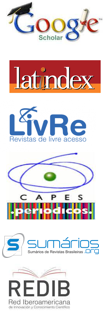As Contribuições do Programa Residência Pedagógica à Formação Inicial dos Licenciandos em Ciências Sociais/UFPA
DOI:
https://doi.org/10.17921/2447-8733.2022v23n3p438-447Resumo
Este artigo busca analisar as contribuições do Programa Residência Pedagógica (PRP/CAPES) à formação de licenciandos em Ciências Sociais da Universidade Federal do Pará, identificando de que maneira suas ações de intervenção afetam o futuro da prática docente. O foco desta investigação empírica recai, mais especificamente, sobre as ações do Núcleo Sociologia (NS), durante os anos de 2018 e 2019. Este trabalho possui natureza qualitativa e realizou uma pesquisa exploratória e descritiva, baseando-se no seguinte percurso metodológico: (1) revisão de concepções e princípios que embasam o tema da formação docente; (2) análise documental do Edital CAPES 06/2018 e da Portaria CAPES nº 38, de 28 de fevereiro de 2018; (3) descrição das ações do Núcleo Sociologia, delineadas em Relatórios Finais. Com base no universo investigado, os resultados indicam que as intervenções do PRP à formação dos licenciandos em Ciências Sociais/UFPA podem ser assim delimitadas: oportunizou a articulação entre teoria e prática; elevou a formação acadêmica e profissional; aumentou a intenção à docência; possibilitou a criação de materiais didáticos e metodologias inovadoras; e promoveu a reflexão sobre o próprio fazer docente. Em conclusão, pode-se afirmar que foi fundamental analisar práticas pedagógicas desenvolvidas pelo PRP, pois, dessa maneira, se faz avançar pesquisas que envolvem os conflitos da formação de professores, bem como serve de parâmetro avaliativo à política de intervenção e sua adaptação para o futuro.
Palavras-chave: Formação Docente. Prática Pedagógica. Política Institutional.
Abstract
This article aims to analyse the contributions of the Pedagogical Residency Program (PRP/CAPES) to the undergraduate students training in Social Sciences at the Universidade Federal do Pará, identifying how their intervention actions affect the future of teaching practice. The focus of our empirical investigation falls, more specifically, on the actions of the Sociology Nucleus (NS) during the years 2018 and 2019. This work is qualitative in nature and an exploratory and descriptive research was carried out, based on the following methodological path: (1) review of the concepts and principles that support the theme of teacher education; (2) documentary analysis of the CAPES Nº 06/2018 and CAPES Ordinance nº 38, of February 28th, 2018; (3) description of the Sociology Nucleus actions, outlined in the Final Reports. Based on the investigated universe, the results indicate that the PRP interventions for the undergraduate students training in Social Sciences/UFPA can be defined as follows: it provided opportunities for the articulation between theory and practice; raised academic and professional training; increased the intention to teaching; it enabled the creation of teaching materials and innovative methodologies and promoted reflection on the teaching process itself. In conclusion, it is possible to state that it was essential to analyse the pedagogical practices developed by the PRP, because thus, research is carried out involving conflicts in teacher education, as well as serving as an evaluative parameter for the intervention policy and its adaptation for the future.
Keywords: Teacher Training. Pedagogical Practice. Institutional Policy.
Downloads
Publicado
Como Citar
Edição
Seção
Licença
Copyright (c) 2022 Revista de Ensino, Educação e Ciências Humanas

Este trabalho está licenciado sob uma licença Creative Commons Attribution-NonCommercial-NoDerivatives 4.0 International License.


